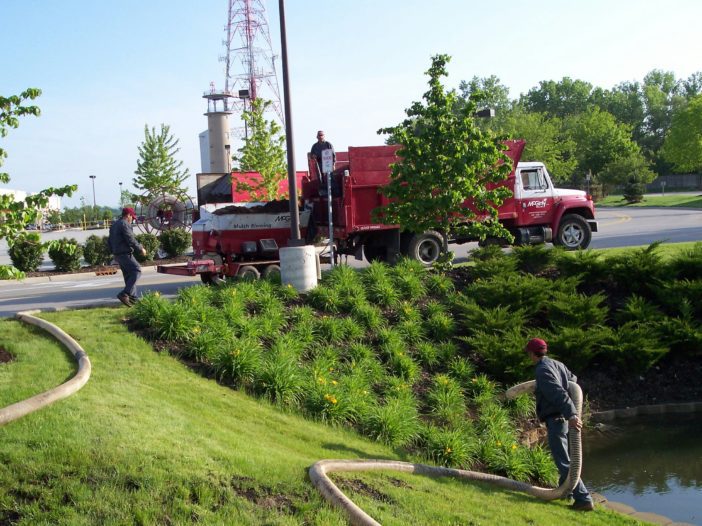If your lawn has dry, dead patches, or if it had dead patches last year that spread, you could have a pest infestation. Two common lawn pests in the Long Grove, Illinois area are chinch bugs and grubs. These pesky insects come back year after year unless they are properly controlled. Keep reading to learn more about the insects, how they damage your lawn, and what McGinty Bros. can do to control them.
What Are Chinch Bugs?
Yellow patches in your lawn that eventually turn brown and die could be a sign of chinch bug damage. Some people misdiagnose chinch bug damage as drought damage, but watering your lawn more isn’t going to help.
Chinch bugs are common lawn pests in the Long Grove area, and they are hard to spot because they are so small, around a 1/4-in. long. The adult bugs are black, and some have white wings. The nymphs can be orange, red, or black. If you get down on your hands and knees and look closely at the base of the grass blades, you can see the little bugs. They can fly, but mostly they walk through lawns.
Chinch bugs have piercing mouthparts, which they use to pierce a grass blade and suck the juices out of it. This dries the blade out, while a toxin that the bugs leave behind also kills the grass. A few chinch bugs in your lawn won’t create noticeable damage, but when they multiply and spread out across your lawn, the dry, dead spots of grass also multiply and spread out.
How Do You Get Rid of Chinch Bugs?
Chinch bugs like heat, so they come out when the temperatures start to rise. They prefer tall fescue, bermudagrass, bentgrass, perennial ryegrass, zoysiagrass, and Kentucky bluegrass. Chinch bug damage is more likely to occur in stressed turfgrass, so the best way to prevent it is to keep your lawn healthy. Moderate fertilization, proper irrigation, regular mowing, and maintaining healthy soil are all great lawn management steps to take for the long-term health of your turfgrass.
If you have a major infestation of chinch bugs, you can use a broad-spectrum insecticide to kill them. However, the insecticide only kills the insects, not their eggs, so you may need to apply it twice, one time several weeks after the other.
What Are Grubs?
Grubs are a common and very destructive lawn pest in Long Grove, Illinois and throughout Chicagoland. They feed on the roots of grass, which causes it to die, usually in late summer and early fall. If you dig up a bit of soil and see white larvae in the shape of a C, you have grubs. You shouldn’t be alarmed by a few grubs. They are only a problem when there are a lot of them. Grubs are the larvae of different types of beetles, so if you notice a lot of beetles early in the summer, and then you notice dead grass late in the summer, that’s a clue that you could have a grub problem.
Other signs that you may have a grub infestation:
- Animals, such as raccoons and skunks, dig up your lawn to eat the grubs.
- Dead patches of lawn can be pulled back like a layer of carpet.
- The ground feels spongy when you walk on it.
What Is the Best Form of Grub Control?
The best way to control grubs is to prevent the larvae from hatching. There are preventative grub control products that are best applied to lawns in spring or early summer. If the preventative treatment is not applied, we have a curative treatment if the grubs appear and begin causing damage. Once the curative treatment is applied, we highly recommend having the preventative treatment applied and annually keep the grubs away.
If your lawn is well-fed and well-maintained, it can handle more grubs than a lawn that is stressed. This means you can help prevent grub damage by taking good care of your lawn.
How Can McGinty Bros. Help Control Chinch Bugs and Grubs in Your Lawn?
 Controlling chinch bugs and grubs can be confusing. It’s easy to use the wrong chemicals, too much chemical, or apply the chemicals at the wrong time of year. Let the lawn care professionals at McGinty Bros. take care of your lawn infestation. We control grubs, kill chinch bugs, and do other lawn care tasks to keep your lawn looking amazing throughout the growing season. You can also count on us to repair chinch bug or grub damage using effective seeding techniques. If you have a grub or chinch bug problem, contact us to schedule your lawn consultation.
Controlling chinch bugs and grubs can be confusing. It’s easy to use the wrong chemicals, too much chemical, or apply the chemicals at the wrong time of year. Let the lawn care professionals at McGinty Bros. take care of your lawn infestation. We control grubs, kill chinch bugs, and do other lawn care tasks to keep your lawn looking amazing throughout the growing season. You can also count on us to repair chinch bug or grub damage using effective seeding techniques. If you have a grub or chinch bug problem, contact us to schedule your lawn consultation.

